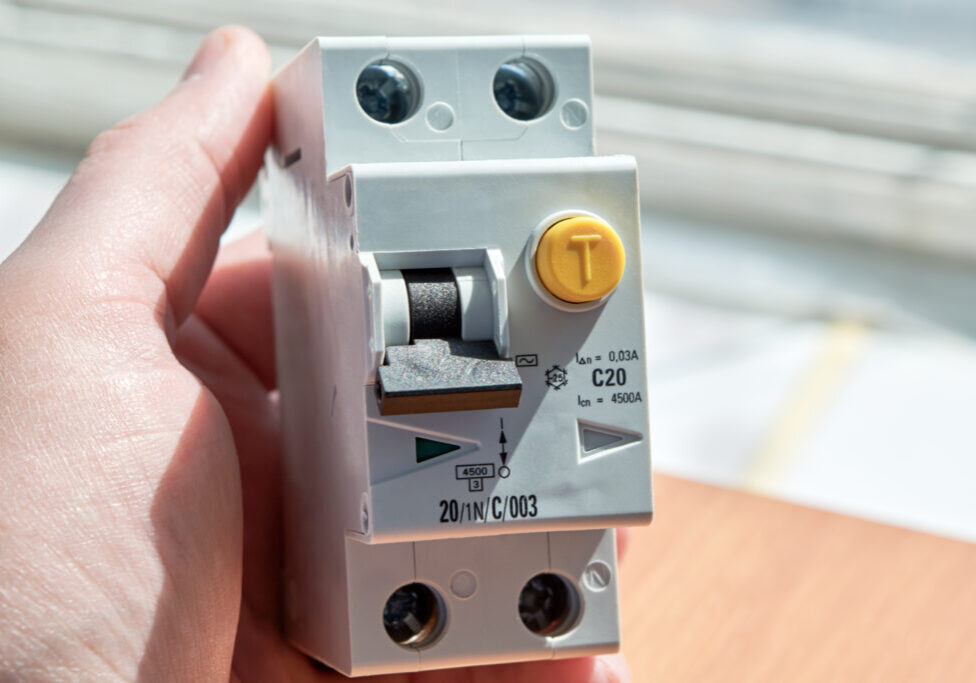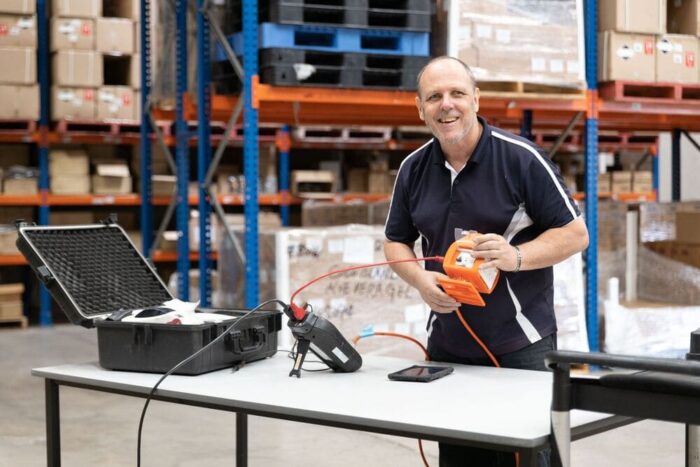Legal obligation under NSW WHS regulations
In New South Wales, employers have a legal responsibility to ensure that electrical equipment in the workplace is safe, properly maintained, and suitable for its intended use, as outlined in the Work Health and Safety Act 2011 and the WHS Regulation 2017.
To meet these obligations, plug-in electrical equipment must be regularly inspected, tested, and tagged by a competent person in line with AS/NZS 3760:2022. This applies to any equipment connected to the power supply via a flexible cord and plug. This standard outlines the frequency of equipment testing based on the level of risk in the environment, and it provides a structured process for inspection, electrical testing, and tagging.
In factory and workshop settings, where equipment is frequently used in harsh or high-risk conditions, testing is typically required every six months. The testing must be carried out by a competent person – someone with the appropriate training and knowledge to inspect and test electrical equipment safely.
Employers must also keep accurate records of all inspections and tests. These records should include the test date, next scheduled test, the technician’s details, and any actions taken to address faults. Any equipment that is unsafe or fails testing must be immediately removed from service. The business should have clear procedures in place for reporting and responding to electrical hazards.
Following a structured testing and tagging program not only supports compliance with WHS laws but also demonstrates a commitment to protecting workers, contractors, and visitors from preventable electrical risks.

Common types of equipment that need to be tagged
In factory and workshop environments, all portable electrical equipment must be tested and tagged to ensure compliance with WHS regulations.
Portable or plug-in electrical equipment
Any electrical device that’s plugged into a socket and exposed to conditions that could cause damage – like moisture, heat, dust, vibration, or mechanical stress -must be inspected and tested by a competent person.
- Power tools (e.g., drills, saws)
- Extension leads and power boards
- Battery chargers (e.g., for forklifts or handheld devices)
- Office electronics (computers, printers used in dispatch areas)
- Three-phase equipment (like sump pumps or large workshop machinery
Testing and tagging of 3-phase equipment requires specialised knowledge, and the technician must be trained and certified in three-phase testing.
RCDs and safety switches
RCDs are designed to protect users from electrocution by quickly cutting off power when a fault is detected. Because they are safety-critical devices, RCDs must be tested by a RCD-testing-qualified technician, using calibrated equipment in accordance with the Australian Standard.
- Fixed RCDs
- Portable RCDs

Understanding risk-based testing frequency
In factory and workshop environments, portable electrical equipment is frequently exposed to harsh and demanding conditions, including dust, moisture, vibration, mechanical damage, and chemical exposure. These factors increase the likelihood of wear, faults, and failure, making regular testing essential for safety and compliance.
According to AS/NZS 3760:2022, a risk-based approach determines the frequency of testing electrical equipment. On workshops and factory floors, where equipment is exposed to physical or environmental stress, testing and tagging must be performed at least every six months. This frequency helps ensure that faults are identified early, reducing the risk of injury, equipment failure, or fire.
Electrical tagging requirements and what the tag must include
Testing and tagging is a structured process designed to confirm that electrical equipment is safe to use. It involves visually inspecting the equipment, conducting electrical safety tests using a Portable Appliance Tester (PAT), and then attaching a durable, non-reusable tag to indicate the equipment has passed inspection.
The tag must clearly display several key details to meet compliance requirements. This includes the name of the person or business that carried out the test, the test date, the next scheduled test date, and a reference to the Australian Standard used (typically AS/NZS 3760:2022). Colour-coded tags are optional for factories and workshops, but are widely used to help manage and monitor testing schedules efficiently.
Record keeping and documentation
Accurate record keeping is a vital part of any compliant test and tag system. In factories and workshops, maintaining up-to-date documentation helps demonstrate that your business is meeting its duty of care under WHS legislation. It also provides a clear audit trail in the event of a SafeWork NSW inspection or incident investigation. These records should be kept for at least seven years, although some businesses choose to retain them longer as part of their safety management system.
Best practices include conducting periodic internal audits, clearly labeling equipment, and making records easily accessible to supervisors and safety officers. During a SafeWork NSW inspection, the ability to produce accurate and well-maintained records demonstrates that you are managing electrical safety proactively and systematically.
Choosing a Test and Tag provider
With the right partner for your test and tag requirements, you can reduce risk, stay on top of testing schedules, and avoid unnecessary disruptions to operations.
Start by confirming that the provider is fully qualified and certified to carry out testing in accordance with AS/NZS 3760:2022. If your site uses three-phase equipment or requires RCD testing, ensure they hold the specialised qualifications needed for these services. It is also important to verify that they carry public liability and professional indemnity insurance, which protects your business in the event of an error or incident.
A regular, scheduled service contract ensures testing is done proactively and on time, reducing the chance of missed deadlines or forgotten equipment. It also helps maintain a consistent testing history, simplifies audits, and gives you peace of mind that your site remains compliant year-round.

Stay Compliant with scheduled test and tag services
Maintaining a safe workplace in a factory or workshop environment requires a proactive, scheduled approach to testing and tagging. Regular services not only help meet legal obligations but also play a vital role in protecting workers, preventing equipment failure, and reducing the risk of costly downtime or incidents.
Every business should review its current test and tag practices to ensure they align with the latest Australian Standards and WHS regulations. If you are unsure whether your current procedures meet compliance requirements, talk to us at Precision Test and Tag. Our qualified team can assess your site, identify any gaps, and recommend a tailored testing schedule based on your risk level and workplace conditions.





